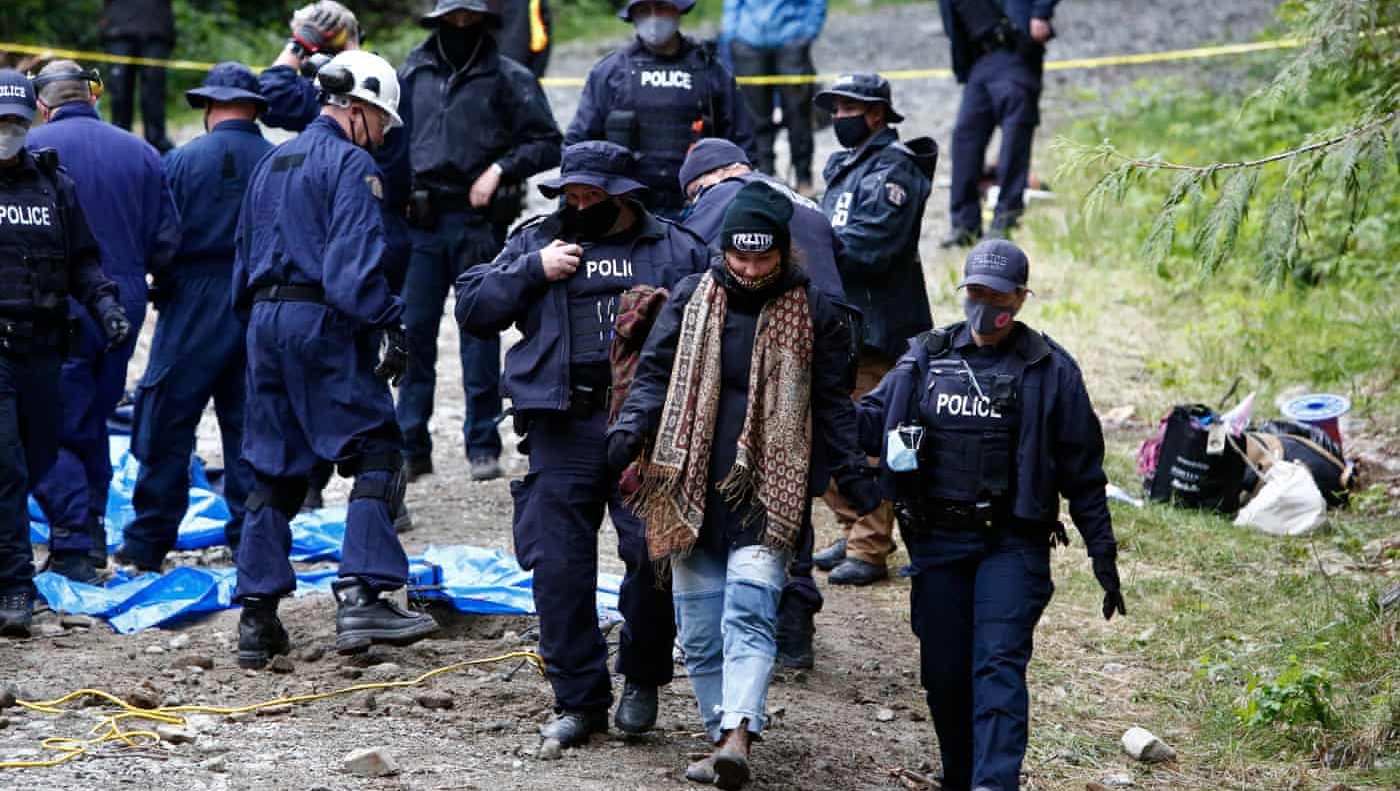
Above Photo: Jesse Winter/The Guardian.
Activists seeking to halt cutting of ancient trees have chained themselves to trunks in remote woodland.
Police in western Canada have arrested more than 270 people as a conflict over old growth logging in British Columbia’s ancient rainforests continues to grow.
At the protest blockades in the remote woodland, hundreds of activists have been chaining themselves to giant tripods made from the trunks of felled trees, suspending themselves in trees for days or more at a time, and even securing their arms inside devices called “sleeping dragons” cemented into the roadway.
The movement is an attempt to pressure the British Columbia government to halt the cutting of what activists and experts say is the last 3% of ancient trees left standing in the province.
The arrests, which involve police removing protesters from the intricate and sometimes precarious contraptions blocking logging roads on southern Vancouver Island, are continuing despite recent promises by the BC government to defer logging for two years in two of the five areas that blockaders are trying to protect: the untouched Fairy Creek watershed and the nearby Central Walbran Valley.
Saul Arbess, a spokesperson with the blockade movement calling itself the Rainforest Flying Squad, said while the deferrals were a step in the right direction, they were not enough to ensure that rare and ancient old growth ecosystems were permanently protected.
“We keep wanting not to confuse deferral with protection. Anything could happen after that two-year period,” Arbess said.
“We think we can move to full protection” in all five areas, he said, adding that any such protection would require the consent of the First Nations whose traditional territory includes the ancient forests in question.
The deferral was requested in early June by the elected leadership of the Pacheedaht, Ditidaht and Huu-ay-aht First Nations, which say they want to take back control over how their ḥahahuułi , or traditional territories, are managed.
In a joint statement, three chiefs of the First Nations said they would use the deferral to develop their own forest stewardship strategies.
“For more than 150 years, they have watched as others decided what was best for their lands, water, and people. This declaration brings this practice to an immediate end,” the statement said.
The Pacheedaht chief councillor, Jeff Jones, did not return the Guardian’s request for comment.
“For more than 150 years, they have watched as others decided what was best for their lands, water, and people. This declaration brings this practice to an immediate end,” the statement said.
The Pacheedaht chief councillor, Jeff Jones, did not return the Guardian’s request for comment.
The Pacheedaht elected council has a revenue sharing agreement in place with the logging company Teal-Jones Group, which aims to log in the area. The Pacheedaht council previously said that interference and “third party activism” – such as by the Rainforest Flying Squad – was not welcome on its traditional territory, and it has repeatedly asked for the protesters to stop blocking the roads.
Outside of the deferral zones, logging activities are expected to continue.
The Rainforest Flying Squad set up the first of their blockades nearly a year ago, on 20 August 2020, to stop construction of a logging road that was approaching the northern ridge of the Fairy Creek watershed.
While the protest movement is opposed by the Pacheedaht elected council, it has support from members of the community, including the Pacheedaht elder Bill Jones, who has repeatedly called for the blockades to continue until his nation’s old growth forests are fully protected.
“We must not stand down,” Jones said. Ancient trees were “guides, teachers, spiritual beings”.
Since mid-May, the Royal Canadian Mounted Police have been enforcing a court injunction against the blockades, which have spread to block multiple roads across several river valleys.
Police have begun using an excavator to dig protesters out of the sleeping dragons, operating the heavy equipment “within inches” of people with their arms locked into the ground, Arbess said.
“There have been accidents,” Arbess said. “People have, you know, been pulled off tripods and fallen. We’re very concerned about this.”
The RCMP said that trained professionals, not police officers, had been running the heavy equipment and that the enforcement was taking place in accordance with provincial work safety guidelines. The police also said they had undertaken medical assessments of each protester before and after their arrests.
“To date we have not received any complaints or reports of injuries,” a police spokesperson, Sgt Chris Manseau, said in an email.
Meanwhile, solidarity protests have sprung up in cities across British Columbia and as far away as Toronto. More than 100 high-profile Canadians, including the former prime minister Brian Mulroney, former governor general Adrienne Clarkson, environmentalist David Suzuki, author Margaret Atwood and singer Neil Young signed a public letter to the British Columbia premier, John Horgan, demanding remaining old growth forests be protected.
The movement has become one of Canada’s largest logging blockades since the 1993 “war in the woods”, when roughly 1,000 people were arrested for blocking logging roads to stop clearcutting in nearby Clayoquot Sound.
Related posts:
Views: 0
 RSS Feed
RSS Feed

















 June 25th, 2021
June 25th, 2021  Awake Goy
Awake Goy  Posted in
Posted in  Tags:
Tags: 
















